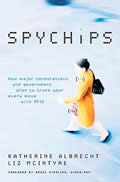Other
McIntyre
Articles:
RFID Vulnerable to Virus Attacks
RFID SPYCHIPS IN PASSPORTS MAY BE JUST THE START
By Liz McIntyre & Katherine Albrecht
August
16, 2006
NewsWithViews.com
RFID-laced passports may be just the start of an Orwellian airport experience, warn privacy advocates and authors Katherine Albrecht and Liz McIntyre as the nation braces for a rollout of the controversial technology in passports this week.
They point to a U.S. Transportation Security Administration (TSA) concept video created by CompEx Inc. that shows how citizens can be tracked and monitored throughout an airport terminal -- without their knowledge or consent.
The animated flash clip is posted on the authors' website.
In the video, citizen "Bob" is remotely identified and tracked via Radio Frequency Identification (RFID) devices as he enters an airport and navigates to his gate. The video ends with chilling frames of a government agent surreptitiously scanning Bob and his belongings as he sits in the waiting area.
CompEx Inc. President Aram Kovach, who developed the film as a demo for the TSA, received a U.S. Patent for the idea he calls "Method for Tracking and Processing Passengers and their Transported Articles" in November of 2005. According to company press releases, TSA officials entertained his ideas twice, once in 2002 and once in 2003, and "offered to direct CompEx in pursuing a segmented objective within the guidelines they have set forth."
"This footage raises the specter of Soviet-style government surveillance creeping onto our free soil," said McIntyre. "People need to know that our government has actively considered these disturbing and invasive RFID concepts. With RFID now appearing in our passports, the threat to our privacy and civil liberties may be more than theoretical."
"RFID passports will do little to keep us safer," Albrecht added. "On the contrary, by requiring us to carry RFID tags in our travel documents, the government is jeopardizing our personal information while doing little to slow down the bad guys."
The new passports are vulnerable to hacking and cloning by criminals. Last week at the Black Hat security conference in Las Vegas, German researcher Lukas Grunwald showed how easily a criminal or terrorist could clone RFID tags like those in U.S. passports using inexpensive and readily available hardware.
� 2006 - Liz McIntyre & Katherine Albrecht - All Rights Reserved
Sign Up For Free E-Mail Alerts
E-Mails are used strictly for NWVs alerts, not for sale
Liz McIntyre is a consumer privacy expert and author of Spychips: How Major Corporations and Government Plan to Track your Every Move with RFID. In this explosive book, McIntyre and co-author Katherine Albrecht reveal how organizations like Procter & Gamble, Gillette, Wal-Mart, and even the U.S. Postal Service plan to use tiny computer chips smaller than a grain of sand to track everyday objects-and even people-keeping tabs on everything you own and everywhere you go.
Katherine Albrecht is a privacy advocate and co-author of Spychips: How Major Corporations and Government Plan to Track your Every Move with RFID. Albrecht has testified on RFID technology before the Federal Trade Commission, the California state legislature, the European Commission, and the Federal Reserve Bank, and she has given over a thousand television, radio and print interviews to news outlets all over the world. Her efforts have been featured on CNN, NPR, the CBS Evening News, Business Week, and the London Times, to name just a few.
Web Sites: SpyChips.com and NoCards.org
E-Mail: liz@spychips.com
The video ends with chilling frames of a government agent surreptitiously
scanning Bob and his belongings as he sits in the waiting area.














